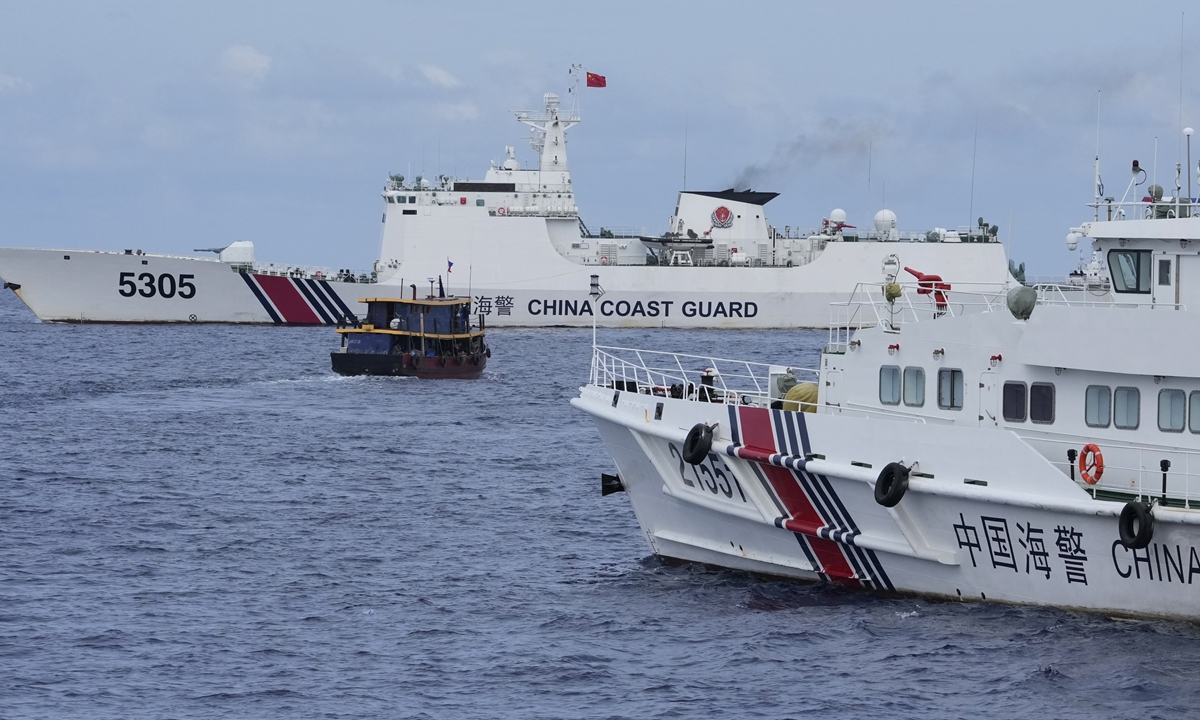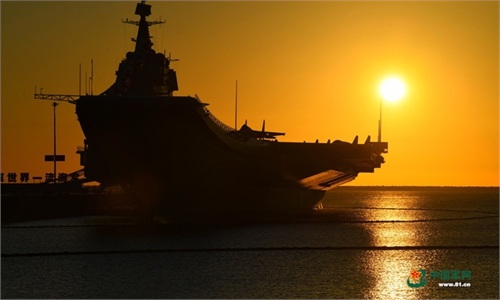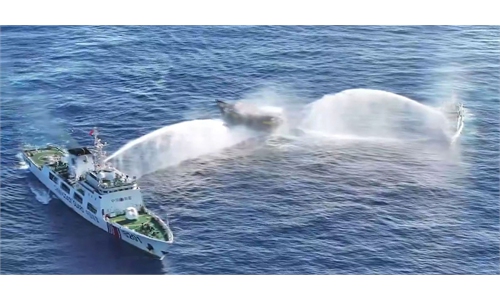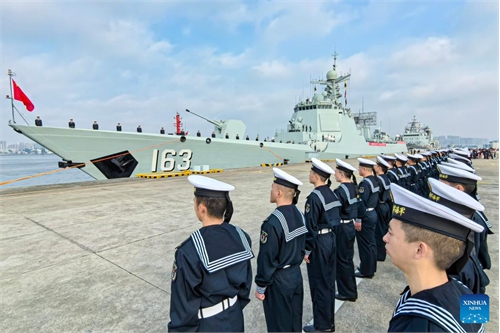Chinese Foreign Minister urges countries outside the region not to stir up trouble in South China Sea

The China Coast Guard issues stern warnings and follows a Philippine vessel that illegally intruded into Ren’ai Jiao (also known as Ren’ai Reef) in the South China Sea, in August 2023. Photo: Visual News
Chinese Foreign Minister Wang Yi on Thursday urged countries from outside the region to not stir up troubles in the South China Sea, as he vows to take justified actions to defend China’s rights and respond with prompt and legitimate countermeasures.
Wang made the remarks at a press conference at the ongoing second session of the 14th National People's Congress, the country's top legislature.
The Chinese people have worked for generations in the South China Sea, and islands and reefs in the South China Sea have long been territories administered by the Chinese governments in accordance with law, Wang said.
Today’s South China Sea is the world’s busiest, safest and freest sea lane, as 50 percent of commercial ships with one third of maritime trade sail past the region without any disruptions or obstacles over decades, Wang said.
“In the current turbulent world, peace and stability in the South China Sea has been maintained thanks to the collective efforts of China and ASEAN member states, and the most important experience we have drawn is that we must adhere to two principles: first, differences should be properly managed and resolved through dialogue, consultation, or negotiation between states directly involved. Second, peace at the sea should be upheld by China and ASEAN member states working together,” the foreign minister said.
On maritime disputes, China has maintained restraint, advocated seeking a solution that all sides can accept based on the spirit of good neighborliness and friendship as well as the respect on history and legal facts, Wang said.
“However, abusing our goodwill should not be allowed, and distorting maritime laws cannot be accepted. In face of deliberate infringements, we will take justified actions to defend our rights in accordance with the law. In face of unwarranted provocation, we will respond with prompt and legitimate countermeasures,” Wang stressed.
Ding Duo, deputy director at the Research Center for Ocean Law and Policy at the National Institute for South China Sea Studies, told the Global Times on Thursday that the one that abused China’s goodwill, distorted maritime laws and made deliberate infringements and unwarranted provocation is the Philippines.
In previous years, China has made temporary arrangements for supplying living materials to the Philippines’ warship illegally grounded on China’s Ren’ai Jiao (also known as Ren’ai Reef) and for Filipino fishermen to fish near China’s Huangyan Dao (also known as Huangyan Island) under certain conditions, which are manifestation of China’s position and its goodwill, but recently the Philippines has been continuously taking provocative actions, leading to tensions on maritime affairs.
China and the Philippines have recently maintained communication on the South China Sea issue, but the Philippines says one thing at the meeting and does another at sea, making it utterly untrustworthy, Ding said.
Ding noted that the Philippines’ occupation of Chinese islands and reefs violates the UN Charter. The South China Sea Arbitration and its ruling are actions by the Philippines to abuse the dispute resolution mechanism of maritime law under the instigation of the US. It cannot resolve disputes, but instead damages the authority of the international dispute resolution mechanism.
Wang Yi said that, “We urge countries from outside of the region to not stir up trouble, not to take sides, and not to become spoilers or perpetrator in the South China Sea.”
Countries outside the region, led by the US, is the external cause of the turbulence in the South China Sea, as US support for the Philippines in military, diplomatic, legal, and public opinion has further strengthened the Philippines’ risk-taking mentality, Ding said.
Apart from the US, countries like Australia and Japan have not played a positive and constructive role in the South China Sea issue. So-called maritime and air joint patrols, joint military exercises, and intelligence interoperability security cooperation carried out by the Philippines with these countries outside the region under bilateral or small multilateral mechanisms are likely to lead to a group confrontation in the region, Ding said.
“This is something that not only China but also ASEAN member states do not want to see,” he said.
Wang’s remarks showed that China, as a guardian of regional peace and stability and a promoter of maritime governance throughout the South China Sea, will respond and act in the face of the temporary escalation of the maritime situation, and it reflected China’s determination, capability, and steadiness in safeguarding its territorial sovereignty and maritime rights, as well as in maintaining peace and stability in the South China Sea, the expert said, noting that the Philippines’ provocative actions at sea have not gained any advantage, and the overall situation of peace and stability in the South China Sea will not be overturned by these waves,
Wang also said that China is willing to work with ASEAN member states to strive for an early conclusion of the Code of Conduct in the South China Sea, and to ensure that the South China Sea remains a sea of peace and cooperation.
Li Kaisheng, vice president of the Shanghai Institutes for International Studies, told the Global Times on Thursday that Wang’s remarks are a direct response to the current situation in the South China Sea that comprehensively elaborated China’s positions.
China’s positions has not changed, including on its sovereignty, its non-recognition of the so-called South China Sea arbitration and its efforts in safeguarding peace and stability in the South China Sea. What have changed are actions by the Philippines and some countries from outside of the region, particularly the US, Li said, citing the Philippines increased provocations on China’s Ren’ai Jiao and Huangyan Dao since 2023.
To safeguard peace and stability in the South China Sea, promoting the negotiations in regard to the Code of Conduct based on the Declaration of Conduct is the key, but this has been hindered by disruptions of countries from outside of the region like the US, as the country does not want to see China and ASEAN member states reach a regional independent agreement to weaken its influence, Li said.
China’s measures against Philippine vessels that recently trespassed into waters off Ren’ai Jiao and Huangyan Dao fully reflected that if the Philippines takes more actions, China will also take further countermeasures, Li said.




